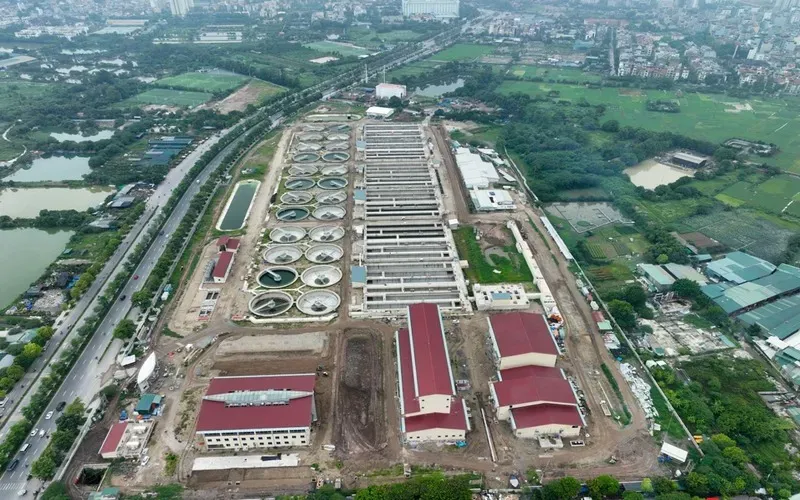Hanoi to build US$16-million wastewater treatment plant
Currently, only 30% of the city's total wastewater is treated.
THE HANOI TIMES — The Hanoi People's Committee has approved a wastewater collection system and treatment plant worth VND430 billion (US$16.5 million) in the outlying district of Hoai Duc.
The project includes a sewer network, surrounding sewer lines, and a wastewater treatment plant to be built between 2026 and 2029.

An aerial view of Yen Xa Wastewater Treatment Plant in Hanoi's Thanh Tri District. Photo: Khanh Huy/The Hanoi Times
A wastewater collection system will be installed, consisting of a semi-separate drainage system, a self-cleansing sewer, a pumping station, and a pressure sewer line.
The waste treatment plant is designed to have a capacity of 7,500 cubic meters per day. It will be sealed to prevent odors, use energy-saving methods, and receive and treat septic tank sludge. After treatment, the sludge will have a minimum dryness level of 30% before being buried.
For Hoai Duc District, home to 12 craft villages and hundreds of workshops, this project is very important because the development of these villages causes environmental pollution, especially wastewater pollution.
Hanoi has many wastewater treatment plants to overcome environmental pollution in craft villages. The Cau Nga Wastewater Treatment Plant, for instance, has a capacity of 20,000 cubic meters per day and treats wastewater from the Duong Lieu, Minh Khai, and Cat Que craft villages.
The Yen Xa Wastewater Treatment Plant in Thanh Tri District, Hanoi's largest, began trial runs in December 2024. With a capacity of 270,000 cubic meters of wastewater per day, it helps clean four major rivers and protect the water environment in the capital's downtown area.
The plant, which costs VND16.3 trillion ($700 million), is necessary to treat Hanoi's environment, as it will collect and purify wastewater from seven districts, including Ba Dinh, Cau Giay, Thanh Xuan, Dong Da, Hoang Mai, Ha Dong, and Thanh Tri.
The project is also essential for revitalizing the heavily polluted To Lich River and improving the lives of the surrounding residents.
Under the city's water drainage plan by 2030, all domestic wastewater will be treated by a system of 41 plants having a total capacity of 1.8 million cubic meter/day.









